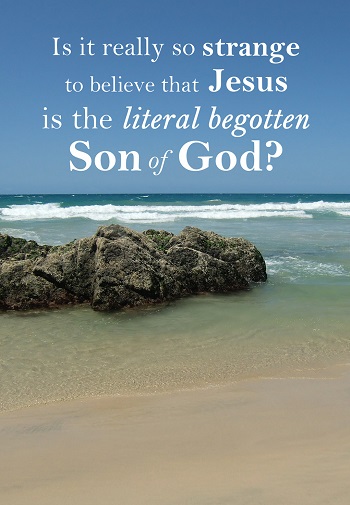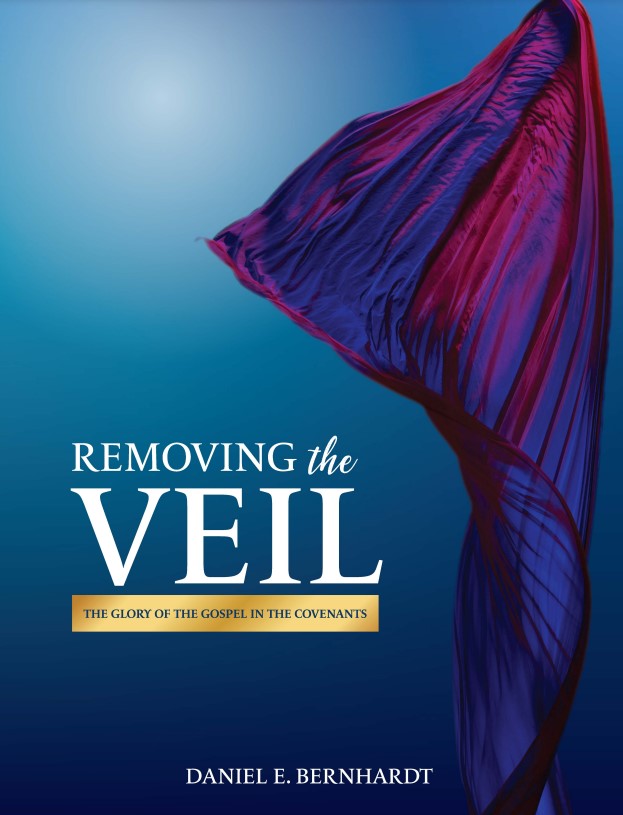Is it Really So Strange to Believe Jesus is the Literal Son of God?
Yes, why do many find it so far-fetched that Jesus really is the Son of God born and brought forth from the Father? Why is this even considered such a great offense that it happens again and again all over the world that brothers and sisters who believe that, have been expelled from the Seventh-day Adventist church?
No one who knows a little about the Bible will deny that in it Jesus is specifically called the Son of God, especially in the New Testament.
• His Father identifies Him as His beloved Son at His baptism (Matthew 3:17; Mark 1:11; Luke 3:22) as well as at His transfiguration on the mountain (Matthew 17:5;Mark 9:7; 2.Peter 1:17)
• His disciples confessed Him as the Son of God ( e.g. Matthew 14:33; Matthew 16:16; John 1:49; John 11:27)
• The demons addressed Him with this title (e.g. Matthew 8:29; Mark 3:11; Mark 5:7; Luke 4:41)
• The Roman centurion confessed: "Truly, this was the Son of God." (Matthew 27:54)
• Satan challenged Him during the temptation in the desert: "If you are the Son of God, then ...” (Matthew 4:3; 4:6)
• After his Damascus experience, Paul preached "Jesus in the synagogues, that he is the Son of God." (Acts 9:20, see also Romans 1:4; 2.Corinthians 1:19; Galatians 2:20, Hebrews 4:14)
• The Ethiopian's confession on the road to Gaza, after a short but intensive Bible study with the Apostle Philip, was: "I believe that Jesus Christ is the Son of God” (Acts 8:37), and qualified him to be baptized by Philip.
• Jesus himself professed to be the Son of God (Luke 22.70; John 3.16; 9.35; John 10:36; Revelation 2:18). He kept confessing that His God was His Father (e.g. Matthew 15:13; Matthew 18:35; Matthew 26:39; Luke 22:29; John 5:17; John 8:28; John 10:15, 17:29 and many more)
So where is the problem to denote those who believe in a real literal sonship of Jesus as seduced and even allow or endorse for them to be excluded from the SDA church?
It is generally recognized that Jesus is the Son of God, but only a metaphorical one, a symbolic son, or a son who plays the role of the son to us human children to make the plan of salvation understandable through a role play of the three persons of the Godhead. But a literal interpretation of the term "only begotten son of God" as a real and true son born or brought forth by the father is considered a heresy to be condemned.
And yet, as the Advent people, we were given a method of interpreting the Bible through our father of faith William Miller, which explicitly requires a literal rule of interpretation in rule 11:
How do you know when a word is used figuratively? If a word makes good sense as it stands, and does no violence to the simple laws of nature, it is to be understood literally; if not, figuratively.[1]
Ellen White is clear about how important these rules are:
Those who are engaged in proclaiming the third angel’s message are searching the Scriptures upon the same plan that Father Miller adopted. {RH November 25, 1884, par. 23}
Many also have no problem with a literal interpretation, unless it is applied to the term "begotten son" in reference to God. If Jesus were really and literally the Son of God, then He would necessarily be younger than the Father and would owe His existence to His father. And that cannot be, can it?
Why can't we allow Jesus Christ to be the truly begotten Son of God who owes His existence to His Father? Then He cannot be God, one thing excludes the other, we think. A God always has everything from His own resources. He has received nothing from anyone else. He has omnipotence, omnipresence and an eternal existence, everything from within Himself. Everything is inherent and has always been so. That is our idea of a god, and anything that does not correspond to it is considered inferior or viewed as lower and does not qualify a being to be called "God" - at least not in our eyes. Therefore by all means we have to enforce a symbolic or metaphorical or temporal meaning of the word "son".
Is it possible that we humans use the wrong measuring rod for the term "God" or "divine"? It is obvious that people in this world worship power, performance and success. The one who can run the fastest, jump the highest, play tennis best, get the most balls into the goal, have the greatest career, get the best grades, looks the most beautiful, can make music the best etc., is one of those in the world most honored and admired.
The reason for this surely lies in our inner worthlessness, which is a natural consequence of sin and our separation from God. That is why we admire performance and success, everything that can increase our value in any way. And that's the reason why a "begotten" son, one who has received everything from His Father, does not appear valuable enough, not qualified enough to be called God and to be our Lord and Redeemer.
If we succeed in breaking free from this wrong pattern of thinking that a God can only be someone, who has everything from within himself (a standard that is not set up anywhere in the Bible), then we can recognize what the Word of God clearly teaches, namely that Jesus really is the Son of God and has received all of His divine qualities from the Father by INHERITANCE:
God, who at sundry times and in divers manners spake in time past unto the fathers by the prophets, hath in these last days spoken unto us by his Son, whom he hath appointed heir of all things, by whom also he made the worlds; (Hebrews 1:1-2)
...Being made so much better than the angels, as he hath by inheritance obtained a more excellent name than they. (Hebrews 1:4) (See also Matthew 28:18; Romans 8:17)
But when the husbandmen saw the son, they said among themselves, This is the heir; come, let us kill him, and let us seize on his inheritance. (Matthew 21:38)
Jesus Himself has no problem confessing that He has received everything from His Father. His values are completely different from ours. He doesn't see it as humiliating when He says:
All things are delivered unto me of my Father. (Matthew 11:27)
The Father loveth the Son, and hath given all things into his hand. (John 3:35)
And Jesus came and spake unto them, saying, All power is given unto me in heaven and in earth. (Matthew 28:18)
For as the Father hath life in himself; so hath he given to the Son to have life in himself; (John 5,26)
that they may behold my glory, which thou hast given me; (John 17:24)
As thou hast given him power over all flesh, that he should give eternal life to as many as thou hast given him. (John 17:2)
But I have greater witness than that of John: for the works which the Father hath given me to finish, the same works that I do, bear witness of me, that the Father hath sent me. (John 5:36)
Then answered Jesus and said unto them, Verily, verily, I say unto you, The Son can do nothing of himself, but what he seeth the Father do: for what things soever he doeth, these also doeth the Son likewise. (John 5:19)
When we start to read the Bible literally and outside of our acquired and inherited scale of values, and we recognize that the inheritance that Jesus received from the Father in the sonship fully qualifies Him to be called "God," then these statements make complete sense:
Wherefore God also hath highly exalted him, and given him a name which is above every name: (Philippians 2,9)
And hath put all things under his feet, and gave him to be the head over all things to the church, (Ephesians 1:22)
I saw in the night visions, and, behold, one like the Son of man came with the clouds of heaven, and came to the Ancient of days, and they brought him near before him. 14 And there was given him dominion, and glory, and a kingdom, that all people, nations, and languages, should serve him: his dominion is an everlasting dominion, which shall not pass away, and his kingdom that which shall not be destroyed. (Daniel 7:13-14)
In this beautiful and fundamental statement in „The Desire of Ages”, Ellen White confirms that Jesus received EVERYTHING from the Father. He received to give:
But turning from all lesser representations, we behold God in Jesus. Looking unto Jesus we see that it is the glory of our God to give. “I do nothing of Myself,” said Christ; “the living Father hath sent Me, and I live by the Father.” “I seek not Mine own glory,” but the glory of Him that sent Me. John 8:28; 6:57; 8:50; 7:18. In these words is set forth the great principle which is the law of life for the universe. All things Christ received from God, but He took to give. So in the heavenly courts, in His ministry for all created beings: through the beloved Son, the Father’s life flows out to all; through the Son it returns, in praise and joyous service, a tide of love, to the great Source of all. And thus through Christ the circuit of beneficence is complete, representing the character of the great Giver, the law of life. {DA 21.2}
This statement also clearly shows that it was not only during Jesus’ time here on earth, that He received everything from the Father, but that this has always been so and it is the law of life for the entire universe.
God is the Father of Christ; Christ is the Son of God. To Christ has been given an exalted position. He has been made equal with the Father. All the counsels of God are opened to His Son. {CCh 76.5}
We see that Christ had not previously held this sublime position. It was bestowed on Him, given to Him. And that was before the creation of the earth.
Jesus' own statements about His God and Father reveal to us that He Himself recognizes and honors His Father as the true God and the source of everything.
If ye loved me, ye would rejoice, because I said, I go unto the Father: for my Father is greater than I. (John 14:28)
My Father, which gave them me, is greater than all; and no man is able to pluck them out of my Father's hand. (John 10:29)
And this is life eternal, that they might know thee the only true God, and Jesus Christ, whom thou hast sent. (John 17:3)
Now they have known that all things whatsoever thou hast given me are of thee. (John 17:7)
Jesus is also clear about who was the God of the Jews, the God of the Old Testament:
Jesus answered, If I honour myself, my honour is nothing: it is my Father that honoureth me; of whom ye say, that he is your God: (John 8:54)
He also instructs us who the true worshipers will worship:
But the hour cometh, and now is, when the true worshippers shall worship the Father in spirit and in truth: for the Father seeketh such to worship him. (John 4:23)
Even in heaven, Jesus was never anyone other than the Son of God. Even there His position was not understood and questioned by Lucifer:
There was contention among the angels. Satan and his sympathizers were striving to reform the government of God. They wished to look into His unsearchable wisdom, and ascertain His purpose in exalting Jesus and endowing Him with such unlimited power and command. They rebelled against the authority of the Son. {EW 145.2}
Again, it is mentioned that Jesus had been exalted by the Father and power and dominion had been awarded to Him.
For our Advent pioneers it was a recognized reality that Jesus was the begotten Son of the Father and has received all things from Him.
James White himself wrote seven months before his death:
The Father was greater than the Son in that he was first. The Son was equal with the Father in that he had received all things from the Father.” (James White, The Review & Herald, January 4, 1881)
J.N. Andrews:
And as to the Son of God, he would be excluded also, for he had God for his Father, and did, some point at the eternity of the past, have beginning of days. So that if we use Paul’s language in an absolute sense, it would be impossible to find but one being in theuniverse, and that is God the Father, who is without father, or mother, or descent, or beginning of days, or end of life” (J. N. Andrews,The Review & Herald, September 7, 1869)
Uriah Smith:
The Scriptures nowhere speak of Christ as a created being, but on the contrary plainly state the he was begotten of the Father....But while as the Son he does not possess a co-eternity of past existence with the Father, the beginning of his existence, as the begotten of the Father, antedates the entire work of creation, in relation to which he stands as joint creator with God. John 1:3; Heb. 1:2. Could not the Father ordain that to such a being worship should be rendered equally with himself, without its being idolatry on the part of the worshiper? He has raised him to positions which make it proper that he should be worshipped, and has even commanded that worship should be rendered him, which would not have been necessary had he been equal with the Father in eternity of existence. Christ himself declares that “as the Father hath life in himself, so hath he given to the Son to have life in himself.” John 5:26. The Father has “highly exalted him, and given him a name which is above every name.” Phil. 2:9. And the Father himself says, “Let all the angels of God worship him.” Heb. 1:6. These testimonies show that Christ is now an object of worship equally with the Father; but they do not prove that with him he holds an eternity of past existence. (Uriah Smith, 1882, Daniel And The Revelation, page 430)
Stephen Haskell:
“The rainbow in the clouds is but a symbol of the rainbow which has encircled the throne from eternity. Back in the ages, which finite mind cannot fathom, the Father and Son were alone in the universe. Christ was the first begotten of the Father, and to Him Jehovah made known the divine plan of Creation” (Stephen Haskell, Story of the Seer of Patmos, pp. 93, 94)
E.J. Waggoner:
This name was not given to Christ in consequence of some great achievement, but it is His by right of inheritance. Speaking of the power and greatness of Christ, the writer to the Hebrews says that He is made so much better than the angels, because "He hath by inheritance obtained a more excellent name than they." Heb. 1:4. A son always rightfully takes the name of the father; and Christ, as "the only begotten Son of God," has rightfully the same name...
It is true that there are many sons of God; but Christ is the "only begotten Son of God," and therefore the Son of God in a sense in which no other being ever was or ever can be. The angels are sons of God, as was Adam (Job 38:7; Luke 3:38), by creation; Christians are the sons of God by adoption (Rom. 8:14, 15); but Christ is the Son of God by birth...
We honor the Father in honoring the Son. We are mindful of Paul's words, that "to us there is but one God, the Father, of whom are all things, and we in Him; and one Lord Jesus Christ, by whom are all things, and we by Him" (1 Cor. 8:6); just as we have already quoted, that it was by Him that God made the worlds. All things proceed ultimately from God, the Father; even Christ Himself proceeded and came forth from the Father; but it has pleased the Father that in Him should all fullness dwell, and that He should be the direct, immediate Agent in every act of creation. Our object in this investigation is to set forth Christ's rightful position of equality with the Father, in order that His power to redeem may be the better appreciated...
The Scriptures declare that Christ is "the only begotten son of God." He is begotten, not created. As to when He was begotten, it is not for us to inquire, nor could our minds grasp it if we were told. The prophet Micah tells us all that we can know about it, in these words: "But thou, Bethlehem Ephratah, though thou be little among the thousands of Judah, yet out of thee shall He come forth unto Me that is to be ruler in Israel; whose goings forth have been from of old, from the days of eternity." Micah 5:2, margin. There was a time when Christ proceeded forth and came from God, from the bosom of the Father (John 8:42; 1:18), but that time was so far back in the days of eternity that to finite comprehension it is practically without beginning. (E.J.Waggoner, Christ and His Righteousness,p. 12, 17, 19)
The Word of God itself gives us testimony:
Who is the image of the invisible God, the firstborn of every creature. (Colossians 1:15)
And the Word was made flesh, and dwelt among us, and we beheld his glory, the glory as of the only begotten of the Father, full of grace and truth. ... No man hath seen God at any time, the only begotten Son, which is in the bosom of the Father, he hath declared him. (John 1:14,18)
The Lord possessed me in the beginning of his way, before his works of old. I was set up from everlasting, from the beginning, or ever the earth was. When there were no depths, I was brought forth; when there were no fountains abounding with water. Before the mountains were settled, before the hills was I brought forth: While as yet he had not made the earth, nor the fields, nor the highest part of the dust of the world. When he prepared the heavens, I was there: when he set a compass upon the face of the depth: When he established the clouds above: when he strengthened the fountains of the deep: When he gave to the sea his decree, that the waters should not pass his commandment: when he appointed the foundations of the earth: Then I was by him, as one brought up with him: and I was daily his delight, rejoicing always before him; (Proverbs 8:22-30)
How easy, how natural it would be, if we could just believe the testimony of Scripture without being influenced by our preconceived notions and thought patterns. Without laying our "human yardstick" on Christ and saying: "No, too short. A beginning? To owe the existence to His Father? That cannot be. That is not enough to be recognized by us as divine or as a god."
With this we actually express: The inheritance that the Father gave to the son is not sufficient in our eyes.
But it is written:
For it pleased the Father that in him should all fulness dwell; (Colossians 1:19)
Which fulness?
For in him dwelleth all the fulness of the Godhead bodily. (Colossians 2:9)
I think it is this false standard that makes most people believe that those who believe in a son actually born of the Father, automatically don't believe in the divinity of Christ. It is simply the natural conclusion of a preconceived notion. Likewise, we are often accused of believing that the Holy Spirit is just a kind of electrical force. That is also a mistake. About the Holy Spirit we believe exactly what the Word of God tells us:
But ye are not in the flesh, but in the Spirit, if so be that the Spirit of God dwell in you. Now if any man have not the Spirit of Christ, he is none of his. (Romans 8:9)
Searching what, or what manner of time the Spirit of Christ which was in them did signify, when it testified beforehand the sufferings of Christ, and the glory that should follow.(1.Peter 1:11)
For I know that this shall turn to my salvation through your prayer, and the supply of the Spirit of Jesus Christ, (Philippians 1:19)
And because ye are sons, God hath sent forth the Spirit of his Son into your hearts, crying, Abba, Father. (Galatians 4:6)
And so it is written, The first man Adam was made a living soul; the last Adam was made a quickening spirit. (1.Corinthians 15:45)
Now the Lord is that Spirit: and where the Spirit of the Lord is, there is liberty. (2. Corinthians 3:17)
The question I want to ask is: Is it really so unbiblical and heretical to believe in a Son that was actually born of the Father? Is this belief justifiable by a literal reading of the Word of God? Can we find a clear “It is written” for this? Certainly far more than one!
What about the idea that three persons of the Godhead have taken on the roles of Father, Son and Holy Spirit to perform a plan of salvation for us? Is there any tangible proof or passages in the Bible or in the Spirit of Prophecy? Or is it just a thesis, an assumption? Can we find a clear "It is written" for this thesis? Hardly if we are honest. I personally have not been able to find the slightest hint of such a role playing game in either the Bible or the Spirit of Prophecy.
We also know that Adam and Eve were created in the image of God:
So God created man in his own image, in the image of God created he him; male and female created he them. (Genesis 1:27)
Adam was created first and then, from his side, from his substance, Eve was created. Was she less human just because she came out of Adam? Was she less valuable because she was younger? Or was it just that Adam had been given her as an authority, as her head? Both were created in the image of God, two beings, of which the one emerged from the other. Isn't that a wonderful picture of the Father and the Son?
Jesus has always and will in the future always recognize the Father as His head and authority.
For he hath put all things under his feet. But when he saith all things are put under him, it is manifest that he is excepted, which did put all things under him. And when all things shall be subdued unto him, then shall the Son also himself be subject unto him that put all things under him, that God may be all in all. (1.Corinthians 15:27,28)
This is precisely what makes Jesus as the only begotten Son so unique and so valuable: He has received everything from His Father, and for that He is grateful and always stays in a trusting and subordinate attitude to His father. In this attitude towards the Father and His self-sacrificing attitude to His creatures, He is the law fully practiced! He is the example of how to behave towards authority for the entire universe. He is meek and humble and does nothing without His Father. In that He is a perfect example for us of trusting obedience and righteousness by faith, because He does nothing of Himself. And He isn't just an actor playing a role, it is His innermost being, His character, which He wants to share with us through His Spirit that calls in us: "Abba, father!"
The principle of authority and submission often has a bad taste in this world, but in the kingdom of God it consists only of giving, blessing, protecting, receiving, passing on, thanking. It is a principle of the blessing stream. Here is another statement from „Desire of Ages”:
But turning from all lesser representations, we behold God in Jesus. Looking unto Jesus we see that it is the glory of our God to give. “I do nothing of Myself,” said Christ; “the living Father hath sent Me, and I live by the Father.” “I seek not Mine own glory,” but the glory of Him that sent Me. John 8:28; 6:57; 8:50; 7:18. In these words is set forth the great principle which is the law of life for the universe. All things Christ received from God, but He took to give. So in the heavenly courts, in His ministry for all created beings: through the beloved Son, the Father’s life flows out to all; through the Son it returns, in praise and joyous service, a tide of love, to the great Source of all. And thus through Christ the circuit of beneficence is complete, representing the character of the great Giver, the law of life. {DA 21.2}
At some point Lucifer had forgotten that he had received everything from the Father through the Son, and that was the beginning of his apostasy. Christ never forgets that everything belongs to Father and that He received everything from Him. In the last book of the Bible, in the letters of the Revelation, He mentions that He has received power over the Gentiles from the Father (Rev 2:27), that the angels belong to His Father (Rev 3: 5) that His Father is His God (Rev 3:12) and that He sits on His throne with His Father (Rev 3:21).
The most wonderful thing about our Lord Jesus is not that He has unlimited inherent power, it is His humble character, His essence, all aspects of the Father's agape love revealed that the father could not have shown us Himself. That's why everyone before throne will say:
Worthy is the Lamb that was slain to receive power, and riches, and wisdom, and strength, and honour, and glory, and blessing. (Revelation 5:12)
The treasure and blessing that we find in the knowledge of the begotten Son of the Father is the perfect example of someone who does nothing of himself, but only what he sees the Father do. The Son of God does not have to prove anything (Satan wanted to provoke Him at the temptation in the desert) and does not have to produce anything to show that He is the Son of God. He believes the word of the Father who says to him: "You are my beloved Son in whom I am well pleased.” He acknowledges His dependence on the Father and trusts that the Father will give Him everything He needs. That is our inheritance in which we can experience righteousness by faith. When we are in Christ and look up to the Father with the same “Abba, Father” spirit and trust Him that He will give us everything and make us “meet to be partakers of the inheritance of the saints in light”, then we can be free from our own efforts to do justice and gain merit from God through our own works.
The key to this experience is knowing the true relationship between the one who is the "only true God and the one whom He has sent" (John 17:3). If we are looking up to a false Jesus, who does everything from His own resources, we will be transformed into the same image It will happen subconsciously because by beholding we will be changed. And if we believe in a role play by three persons of the Godhead, then we will find God deep within us as untrustworthy, even if we are not aware of it.
The Father and the Son have a true loving father-son relationship. Jesus is still "in the bosom of the father." The Bible calls him the Agape Son. Ellen White often calls him that "Darling-Son." In the knowledge of this relationship lies salvation for us, because then we recognize what it meant for the Father to give His beloved Son for our salvation and how much that reveals His love for us.
In this was manifested the love of God toward us, because that God sent his only begotten Son into the world, that we might live through him. (1.John 4:9)
For God so loved the world, that he gave his only begotten Son, that whosoever believeth in him should not perish, but have everlasting life. (John 3:16)
And to know the love of Christ, which passeth knowledge, that ye might be filled with all the fulness of God. (Ephesians 3:19)
The knowledge of God's love will bring about everything in us that we can never achieve by our own work or by fear. It will free us from the unconscious urge to rebel and seek our consolation in the temporary pleasures of sin. We then drink from a sweeter spring and no longer desire the stagnant waters of this world.
Only knowledge of the Father's agape will be able to achieve this. With a wrong image of God it is impossible to be free from sin. Therefore it is written:
And I looked, and, lo, a Lamb stood on the mount Sion, and with him an hundred forty and four thousand, having his Father's name written in their foreheads...And in their mouth was found no guile: for they are without fault before the throne of God. (Revelation 14:1,5)
Whosoever shall confess that Jesus is the Son of God, God dwelleth in him, and he in God. (1.John 4:15)
Who is a liar but he that denieth that Jesus is the Christ? He is antichrist, that denieth the Father and the Son. Whosoever denieth the Son, the same hath not the Father: he that acknowledgeth the Son hath the Father also. (1.John 2:22,23)
Jesus Christ is completely divine, although He was born of the Father. The inheritance that he has received from the Father is completely sufficient for the fullness of the Godhead to dwell in Him. His power is not in an eternal existence, but in His humble and devoted character that places the glorification of his Father and the wellbeing of his creatures above everything. When we look at this Jesus, by beholding we will be transformed into the same image. May we all enter into this blessed experience!
Whosoever believeth that Jesus is the Christ is born of God: and every one that loveth him that begat loveth him also that is begotten of him. (1.John 5:1)
In this was manifested the love of God toward us, because that God sent his only begotten Son into the world, that we might live through him. (1.John 4:9)
[1](http://maranathamedia.com/downloads/books/Life-Matters-2019.pdf )

 Download in Booklet form
Download in Booklet form



